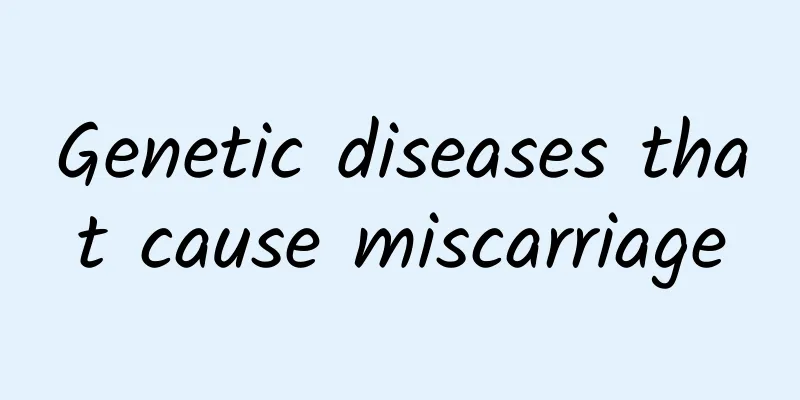Genetic diseases that cause miscarriage

|
Genetic diseases that cause miscarriage can be prevented and treated through genetic counseling, prenatal diagnosis and assisted reproductive technology. Common causes include chromosomal abnormalities, single-gene genetic diseases and multi-gene genetic diseases. Chromosome abnormalities are the most common cause of miscarriage, accounting for about 50%-60%, including abnormal chromosome number and structural abnormalities. Single-gene genetic diseases such as thalassemia and cystic fibrosis may also cause miscarriage. Multi-gene genetic diseases such as congenital heart disease and neural tube defects are associated with the risk of miscarriage. 1. Chromosome abnormality is one of the main causes of miscarriage, including numerical abnormalities and structural abnormalities. Numerical abnormalities include trisomy syndrome and monosomy syndrome, and structural abnormalities include translocation and inversion. These abnormalities may lead to abnormal embryonic development and ultimately miscarriage. Preventive measures include genetic counseling and prenatal diagnosis, such as amniocentesis and chorionic villus sampling, and appropriate measures can be taken if abnormalities are discovered early. 2. Single gene genetic diseases such as thalassemia and cystic fibrosis may lead to miscarriage. Thalassemia is caused by mutations in the hemoglobin gene. Patients may suffer from severe anemia, which affects fetal development. Cystic fibrosis is a genetic disease that affects the lungs and digestive system and may lead to fetal maldevelopment. Through genetic testing and genetic counseling, carriers can understand the risks and choose the appropriate way to have children. 3. Polygenic genetic diseases such as congenital heart disease and neural tube defects are associated with the risk of miscarriage. Congenital heart disease is caused by the combined effects of multiple genes and environmental factors, which may lead to abnormal fetal heart development. Neural tube defects such as spina bifida and anencephaly may be related to abnormal folic acid metabolism. Folic acid supplementation and regular prenatal examinations can help reduce the risk. 4. Genetic counseling is an important measure to prevent miscarriage caused by genetic diseases. Through family history surveys, genetic testing and other methods, the genetic risk of couples is assessed and fertility advice is provided. For high-risk couples, assisted reproductive technology such as preimplantation genetic diagnosis (PGD) can be selected to screen healthy embryos for transplantation to reduce the risk of miscarriage. 5. Prenatal diagnosis is an important means of early detection of genetic diseases. Fetal chromosome and gene abnormalities can be detected through amniocentesis, chorionic villus sampling, non-invasive prenatal genetic testing and other methods. Early detection of abnormalities can enable timely measures to be taken, such as termination of pregnancy or intrauterine treatment, to reduce the risk of miscarriage. Genetic diseases that cause miscarriage can be prevented and treated through genetic counseling, prenatal diagnosis and assisted reproductive technology. Chromosome abnormalities, single-gene genetic diseases and multi-gene genetic diseases are the main causes. Through genetic testing, genetic counseling and prenatal diagnosis, couples can understand genetic risks and take corresponding measures to reduce the risk of miscarriage. Choosing the right way to give birth and regular prenatal examinations can help improve the success rate of childbirth and protect the health of mothers and babies. |
<<: How long after abortion can you get pregnant
>>: Is 1.6cm endometrium serious?
Recommend
People over 40 have bloated bellies and short lives, exercise to lose fat and prevent stroke
My father is busy at work and has many social eng...
Stay at home to prevent the epidemic, and seasoning bags become the star on the table! Nutritionists teach you 3 ways to choose smart and eat healthily
There have been a series of local cases in the co...
What to do if there is residue in the cervical canal after spontaneous abortion
If there is any residue in the cervical canal aft...
Which department should pregnant women go to for uterine fibroids? Pregnant women with uterine fibroids should go to obstetrics or gynecology
Which department should pregnant women go to for ...
Is it easy to get pregnant with pelvic inflammatory disease?
Pelvic inflammatory disease is a common disease a...
Correctly understand the difference between vulvar white lesions and vulvar leukoplakia
Do you know the difference between vulvar white l...
Don’t forget breakfast when losing weight, and don’t have a NG breakfast! Nutritionist: Must-eat high-fiber, high-protein breakfast foods
Three meals a day are essential for losing weight...
The main symptoms of uterine fibroids are as follows
Uterine fibroids are a gynecological disease that...
Methods to prevent gynecological inflammation after abortion
Spring is the beginning of all things, giving peo...
Can endometritis and pelvic inflammatory disease be cured?
Endometritis and pelvic inflammatory disease can ...
What are the basic symptoms of uterine fibroids? What are the feelings and symptoms of uterine fibroids?
Uterine fibroids are a common benign tumor in gyn...
How to prevent the consequences of uterine fibroids?
The consequences of uterine fibroids may include ...
Is it a big deal if I have sex with a condom 16 days after an abortion?
Having sex 16 days after an abortion is dangerous...
What are the causes of physiological hyperprolactinemia?
Hyperprolactinemia is caused by various reasons t...
Clapping after meals helps digestion and burns fat easily
Don’t just sit on the sofa and watch TV after a m...









